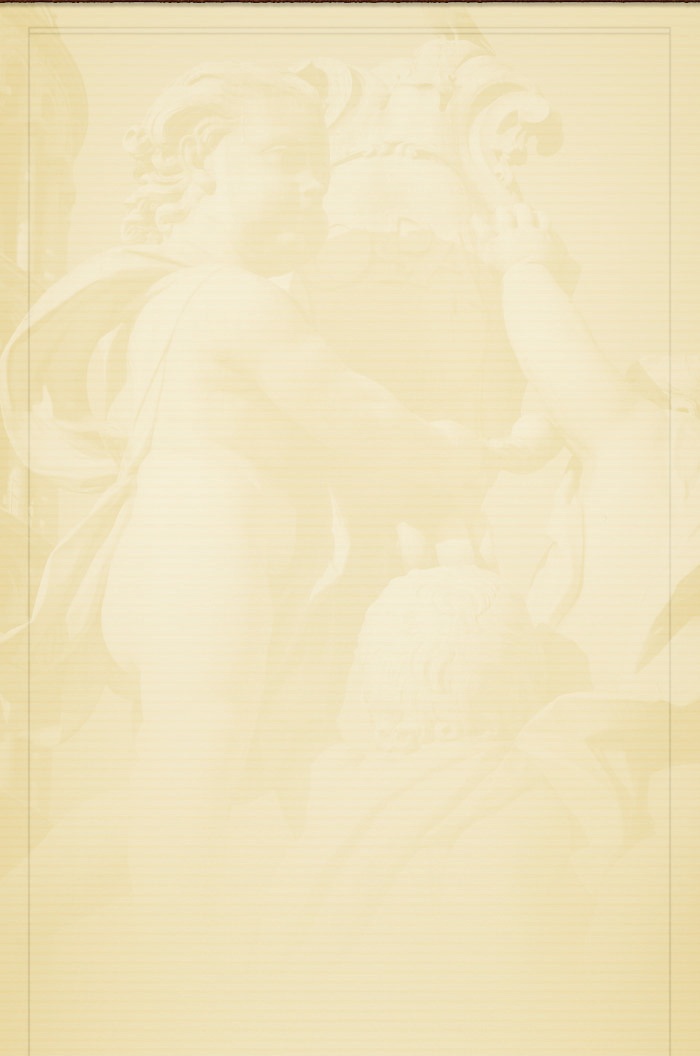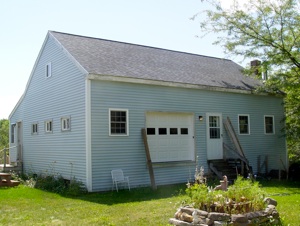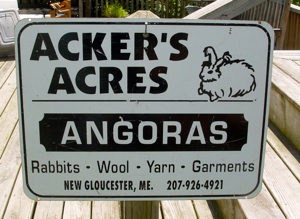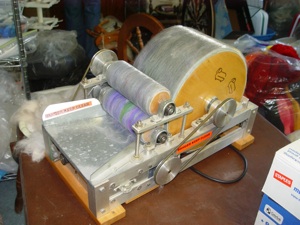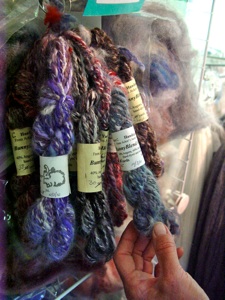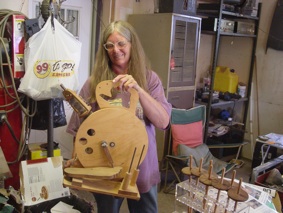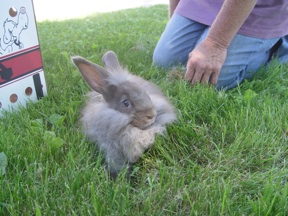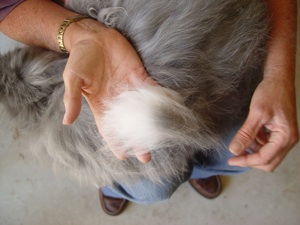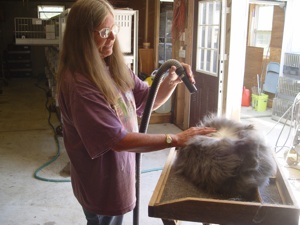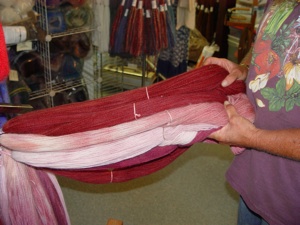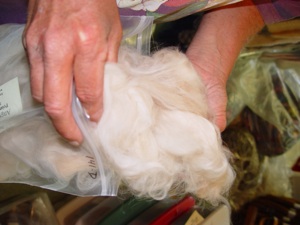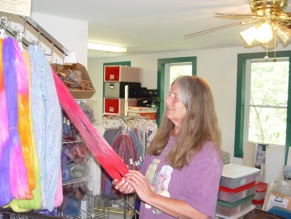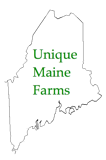Directions:
-
-Come to Gray (which is about 1/2 hour north of Portland)
-
-Head North on Rt 100/202/4 toward Auburn.
-Go about 4.5 miles.
-Turn right onto Gloucester Hill Road
-Go about 1/4 mile.
-Penny Road is on your right.
-
-Our driveway is on your left. Light blue colonial house and barn.
Products:
Angora rabbits, yarn, wool, garments, spinning wheels, bobbins
What Makes Acker’s Acres Farm So Unique?
Sometimes when individuals, who are not familiar with the fiber world, see wool hats, sweaters, and socks for sale, they immediately assume that the wool came from sheep. Some people are surprised to learn that many woolen garments today originate from the wool of dogs, goats, bison and Angora rabbits.
In an attempt to gather more information about
Angora rabbits, a visit was made to Beth Acker of Acker’s Acres Angoras in New Gloucester, Maine. With her thirty-two years of experience raising Angora rabbits she proved to be a wealth of information.
Angora rabbits have a rich and colorful history. They originated in Turkey and were revered in ancient civilizations. In France they were associated with the nobility in the eighteenth century and have an excellent reputation as pets.
There are four kinds of Angora rabbits recognized by the American Rabbit Breeders Association - French, English, Giant, and Satin. Beth primarily raises German and German/French Angora rabbits. The wool of the Angora rabbit is prized for its thermal value. It is seven times warmer than sheep’s wool because the air cells in the fiber prevent the heat from escaping. Angora wool is also cleaner and lighter and softer than the wool of a sheep. It is excellent for repelling moisture and for its ability to “bloom” when it has been spun into garments.
To harvest Angora wool it is either plucked, combed, or cut during the time that the rabbit regularly sheds their wool during his or her three-month molting cycle. The rabbit is not harmed when the wool is harvested. The range of colors of Angora rabbits includes various shades of white, tan, chocolate, black, brown, blue, orange, cream, and silver. White angora wool is valued for its outstanding ability to accept dyes.
Acker is renowned for her “Bunny Blend” trademark yarn. The wool of Angora rabbits and merino sheep are combined in the “Bunny Blend.” This mixture prevents the handmade garment from being too hot to wear and also assists with helping to prevent the garment from losing its shape or drooping.
Beth Acker grew up on a farm in northern Maine. Her mother introduced her to many traditional skills such as cooking, sewing, knitting, canning vegetables, etc. but she never learned how to spin wool.
In 1980, when she visited the Sheep Festival in Cumberland, Maine, she became hooked on rabbits and spinning after watching a spinning demonstration. After connecting with her Great Aunt who raised rabbits in Brooks, Maine, she embarked on a path to a hobby that has evolved into a most unique Maine farm and business.
The first steps along this “bunny path” involved a five-year period of Beth showing some of her rabbits throughout New England. Before much time had elapsed, Beth’s rabbits were often earning top points in the show circuit. Although she enjoyed the showing of her rabbits there was always the “pull” to become involved with spinning wool.
Beth purchased her first spinning wheel from Martha Hall’s Yarn Shop in Yarmouth and also took spinning lessons there. It took about six months before Beth felt proficient on the spinning wheel. She reminisced about how there were a few times she was ready to “throw the wheel out the window.” But patience and practice prevailed. The three or four rabbits that she owned during that time period proved sufficient to make hats, mittens, and scarves for presents for her family for birthdays and the holidays.
If you ask most fiber lovers you will learn that there is something very therapeutic about spinning. Beth’s late husband, Mark Chabe, was a mechanic who faced some teasing at work for his interest in spinning. He explained that it was relaxing for him. Spinners find pleasure in the soothing, hypnotic, rhythmic repetitive movements. For many, spinning provides an outlet for meditation and contemplation.
The sense of peace and calmness that is brought about by spinning correlates with the feeling of gentleness that is associated with the Angora rabbits themselves. If you have the opportunity to observe them for any length of time it is difficult not to be impressed by their tranquil and gentle ways. They usually are receptive to being held and groomed.
Although some spinners choose to acquire a few rabbits for their source of wool, most do not go to the level of the housing and the raising of one hundred rabbits as Beth Acker has done! Her rabbits are usually combinations of German white rabbits and German crosses (white and colored) that are bred for high wool production and easy grooming. German Angora rabbits were originally raised on a large commercial basis and were genetically selected not to shed so that they could be clipped for their wool. They were only introduced into the United States about twenty-five years ago.
Most everyone is familiar with all the bunny jokes regarding their prolific breeding patterns. The gestation period for rabbits is only thirty days. They have a life span of five to seven years. Beth breeds the rabbits in a controlled and purposeful way. Because she keeps one hundred rabbits, on an average she is breeding three litters each spring and fall to replace those rabbits that have aged or have been sold. She does sell some of her bunnies and takes special orders for rabbits.
Beth opted not to house her rabbits outside because of the dangers caused by predators such as hawks, dogs, coyotes, and fox. She has a system of cages with automatic waterers and feeders. The building is heated in the winter and cooled in the summer and free from wind and weather.
Beth views the fact that rabbit farmers, like herself, do not require a large amount of land and fencing as real assets. As far as the costs of feeding and caring for her rabbits, Beth believes that they certainly are good producers in relation to the costs for their care. They do involve an investment of time as the rabbits are groomed regularly and their toenails need to be clipped on a monthly basis.
When asked about what she likes most about her rabbits Beth explained that their gentleness was greatly appreciated and she particularly loved spending some time after feeding them and listening to one hundred rabbits all chomping on their food at the same time! When questioned about what she liked least, she replied that cleaning their droppings from the trays under the cages wasn’t her most favorite chore. Beth does have quite a pile of rabbit manure that she is selling. She even has a tractor to load it into a vehicle if any readers are interested!
Upstairs in her barn, visitors delight in “The Fiber Porch” that Beth has lovingly filled with her fiber products. She sells two ounce bags or one ounce carded batts. Her clean prime adult Angora is ready to spin. The combings have no matts and are great for carding and blending. She also sells baby wool for felting.
Beth’s carded fiber selections include one ounce batts of Angora wool. Her special “Bunny Blend” is forty percent Angora and sixty percent soft American wool. She also carries other natural and dyed exotic fibers and eight ounce batts of multi-colored “Bunny Blend.”
Handspun and custom millspun yarns and Angora and Bunny Blend yarns fill her shop. Fellow fiber artisans, Pogo and Marcia of Friend’s Folly Farm in Monmouth help to spin much of Beth’s Angora wool at their spinning mill.
In The Fiber Porch there is also a selection of various patterns for the knitting of scarves, mittens, baby booties, tams or berets, adding cuffs to bedsocks, crochet, hair scrunchies, and felt mittens. The beautiful knitting done by Beth’s mother is on display and also available for sale.
By the end of October, Beth hopes to expand on the offerings presently available in her “The Fiber Porch.” She plans on opening a large yarn and fiber shop in a former workshop of her barn. She will carry Maine yarns, fibers, wool, alpaca, mohairs, and spinning wheels.
Autumn will be a busy time for Beth. In addition to opening her shop she will be demonstrating and selling her fiber products at the Common Ground Fair in Unity, the Fryeburg Fair, and the New England Fiber Festival in Springfield, Massachusetts.
On October 27 and 28, 2012, Beth will be hosting an Angora Free Seminar and Open House at her farm. Visitors can learn spinning, grooming, rabbit care and breeding. There will be several Angora raisers and rabbits, cages, and spinning fibers will be for sale. Visitors can bring rabbits, spinning wheels, and a picnic lunch.
Beth is very interested in sharing information about Angora rabbits and spinning. She is a knowledgeable and enthusiastic supporter of rabbit farming and loves the camaraderie, friendships, sharing, and learning that takes place in the fiber world.
When the interview for this profile took place, one of Beth’s customers, who had purchased a buck for breeding, stopped by for some help with the sexual identification of her six bunnies that were almost six weeks old. Since the customer did not want to breed her rabbits, she needed to determine if they were male or female for separation purposes. At six weeks of age it is somewhat of a challenge to properly identify the gender of a bunny. The sex identification session was filled with valuable insights into the different characteristics often exhibited by bucks and does. In addition there were quite a few laughs when Beth had to correct a few inaccurate assessments!
Just minutes into the rabbit sex identification session, Beth and her customer animatedly started talking about yarns, and spinning wheels, and bobbins. The “fiber world” seems filled with good, friendly folks who are eager to learn and share their knowledge. They seem to place a high value on traditional crafts, farming, networking with others, and the support of the local economy.
